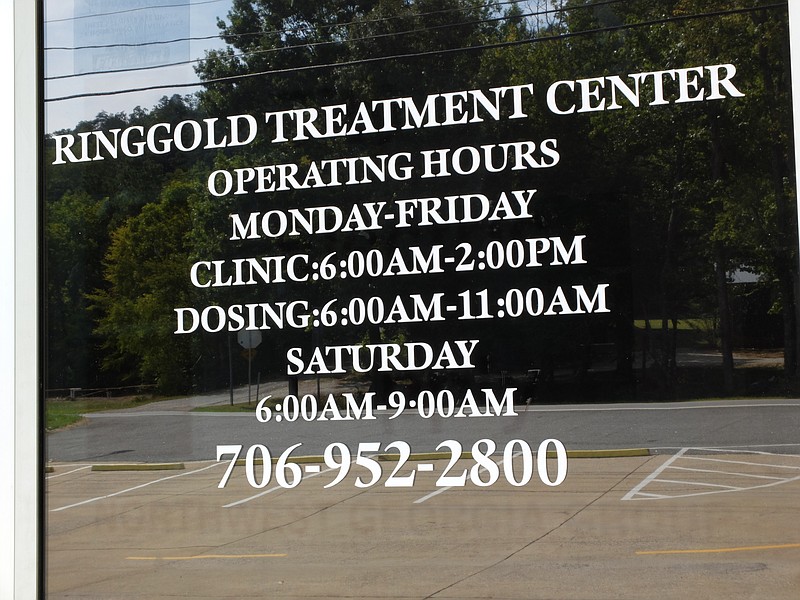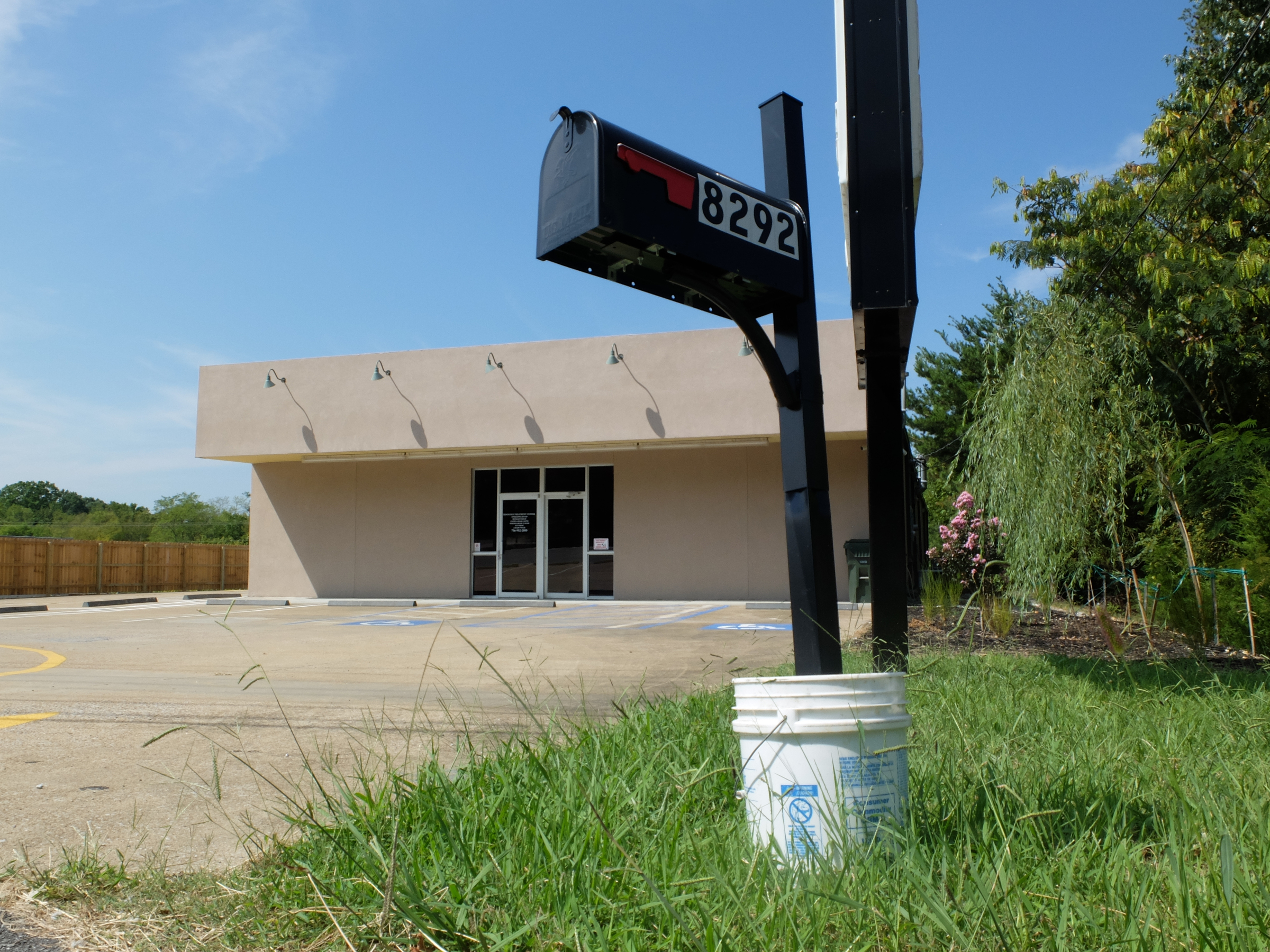Number of methadone clinics, by state
Alabama: 24Florida: 67Georgia: 67North Carolina: 53South Carolina: 20Tennessee: 12*Source: U.S. Substance Abuse and Mental Health Services Administration
RINGGOLD, Ga. - From the beginning, she wants to make this clear: The argument isn't about the science.
Shelley Fow doesn't want to debate the research behind methadone clinics, the stacks of studies saying it's a good thing, or the stacks saying the treatment raises health concerns. Fow is fine with a new clinic. She just doesn't want it here, on Highway 41, across from a school bus stop, about half a mile southeast of downtown Ringgold.
"That's getting a little too close for comfort," said Fow, who lives down the street.
Fow might be throwing punches after the fight has ended, though. City officials don't think they can stop the business from opening. The owners of Ringgold Treatment Center applied for a license from the proper state agency in May. The clinic's doors should open soon, assuming the city gives the owners an occupational tax license.
But Fow is trying to push back. After learning about the clinic last month, she started a Facebook group for people to voice opposition. It had 347 members as of Friday, and a Change.org petition had gathered 709 signatures.
Fow also has asked residents to protest the clinic during the Ringgold City Council meeting Sept. 12. She believes city officials can find a way to stop the business from opening. Maybe it would clog traffic too much, for example.
"The government is notorious for finding and creating loopholes," she said. "There's got to be one for this."
But Mayor Nick Milwood and Councilman Larry Black believe their hands are tied, even though both say northwest Georgia already has too many methadone clinics, which treat opioid addiction by dispensing drugs that block cravings and withdrawal symptoms. Some clinics also offer counseling.
Critics say the programs are not effective, swapping one drug addiction for another. Supporters say the treatment is one of the only realistic ways to help addicts function and recover.
But with concerns from the Ringgold City Council, along with other local politicians, the issue is being studied in Atlanta.
State Sen. Jeff Mullis, R-Chickamauga, and state Rep. Tom Weldon, R-Ringgold, sponsored a bill this year that put a moratorium on new licenses for methadone clinics, beginning June 1. The bill also created a study committee, which this fall will look into why Georgia has produced more methadone clinics than some surrounding states.
While Tennessee and Alabama have a combined 36 methadone clinics, according to the U.S. Substance Abuse and Mental Health Services Administration, Georgia features 67. Not including the new one, there are already three clinics all told in Fort Oglethorpe, Ringgold and Rossville.
Weldon said methadone clinics are needed in some cases, but need strict oversight. He suggested methadone clinics should be run like pain management clinics.
In 2013, Weldon sponsored a law mandating that pain management clinics must be owned by doctors. The bill aimed to ensure that the owner will be concerned about running the operation legally.
"You have to have a physician own it," Weldon said. "Those are the people that have the most to lose by not providing good health care, or allowing the profit motive to override the regulation of health care."
Mullis told National Public Radio the state should require a state Certificate of Need, similar to those required for hospitals and some other medical facilities, for prospective methadone clinics. The owners would have to prove clinics would benefit an area, and opponents could register their objections to the license being issued.
This method would create another hoop to jump through. But the owners of Ringgold Treatment Center say they already have to jump through plenty of hoops.
Before opening, the Georgia Department of Community Health requires potential owners to prove they met the standards of the Substance Abuse and Mental Health Services Administration, the U.S. Drug Enforcement Administration and the Georgia State Board of Pharmacy.
The Ringgold Treatment Center owners, who asked for anonymity out of fear of harassment from some protesters, said they aren't against potential reforms proposed by the Legislature. Clinics need to be inspected often, and the Department of Community Health only has three surveyors checking into all the facilities in the state.
But, one of the owners said, their operation will serve a need as reports of heroin abuse rise in the United States. According to the U.S. Centers for Disease Control and Prevention, there were 1,206 drug overdose deaths in 2014 - a 9.8 percent increase over 2013.
One of the owners worked as a nurse and counselor at a methadone clinic for seven years before trying to open the Ringgold Treatment Center. They have also hired a doctor and a medical director.
"We're in the middle of an unprecedented opioid epidemic," said one of the owners. "It's one of the worst public health crises in American history. This treatment saves lives."
Milwood is concerned about another clinic coming into Ringgold. He said two of his high school friends died from the use of methadone in the late 1990s.
"So many people in the community have very strong emotional reactions to things they've seen their friends and family go through," he said.
Fow said that, while methadone clinics may work, she would prefer them not to be in the middle of town. An analyst by trade, Fow said she is looking for statistics that show how criminal activity and traffic patterns are affected by a clinic.
Fort Oglethorpe Police Capt. Gary McConathy said clients have lined up at some local clinics several hours before they open, waiting for their treatment. Nearby companies complain about patients littering in their parking lots. However, McConathy said, the issue hasn't really come up in about a year.
Black, the Ringgold councilman, used to serve as the Lookout Mountain Judicial Circuit's Drug Task Force commander. He, too, has concerns about the type of people who come for methadone treatment, but said they can't legally be kept out.
The owners of the Ringgold Treatment Center say they won't attract loiterers. They have the ability to set the tone, tell the patients how to act if they want to be part of the program. The clinic will open at 6 a.m., they said. The clients will come in, take their medication, receive counseling and be on their way.
"The perception is that this is a drug house," said one owner. "That's disappointing to us because it shows the level of misunderstanding around this treatment. It shows us the work we need to do in terms of educating people."
Contact staff writer Tyler Jett at 423-757-6476 or tjett@timesfreepress.com. Follow him on Twitter @LetsJett.

